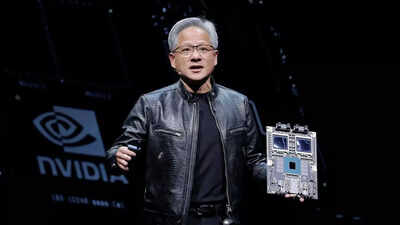ARTICLE AD BOX

Nvidia CEO Jensen Huang recently visited the White House to personally lobby President Donald Trump, a report claims. This visit has reportedly led to the US Commerce Department beginning to issue licenses for the H20 AI chips, which are designed specifically for China. The move follows weeks of inaction by the government. According to a report by the Financial Times, a US official has confirmed that the Bureau of Industry and Security, which manages export controls within the Commerce Department, has now started issuing the licenses for the H20 chip after Huang’s visit. Nvidia developed this chip specifically for the Chinese market after the Biden administration imposed export controls on more advanced AI chips.In April, the Trump administration had initially taken a stricter stance, telling Nvidia it could not sell the H20 to China. However, after Huang visited the White House and lobbied directly with the president, this position seems to have reversed. The report also cited sources familiar with the decision to claim that the Commerce Department began issuing licenses just two days after Huang met with Trump in the Oval Office.
Why US security officials were concerned about Nvidia selling H20 chips to China
Nvidia’s H20 AI chips have become a point of contention between US security officials, who claimed that permitting their sales to China could strengthen its military. Meanwhile, Nvidia argued that restricting US technology exports pushes China to develop its own capabilities faster.
A previous FT report claimed that 20 security specialists — including Matt Pottinger, former deputy national security adviser under the first Trump administration, and David Feith, who served on the National Security Council earlier this year — sent a letter to the US Commerce Secretary Howard Lutnick urging him to block H20 sales to China.In their letter, the security officials described the move as a “strategic mistake” that could undermine the United States’ economic and military position in artificial intelligence. Nvidia called the criticism “misguided” and disagreed with claims that China could use the H20 to strengthen its military programs.In the July quarter, Nvidia lost $4.5 billion and missed an additional $2.5 billion in sales after the US imposed a licensing requirement on AI chip exports to China. The rule, which Nvidia had not anticipated, was seen as effectively halting its legal chip sales in a market Huang projects could reach $50 billion within three years. The company had also forecasted a $8 billion revenue hit from China for the quarter.However, Nvidia is considering developing a redesigned AI chip for China that complies with new US export rules. Huang has warned that the restrictions could give companies like Huawei an advantage in the global AI hardware race. Nvidia’s market share in this segment has already fallen from 95% to 50% over the past four years as Chinese competitors advanced, which Huang in May called a “failure” of US export policy.
India Overtakes China in US Smartphone Exports | Apple’s Big Move



.png)
.png)
.png)
















 4 hours ago
3
4 hours ago
3









 English (US) ·
English (US) ·